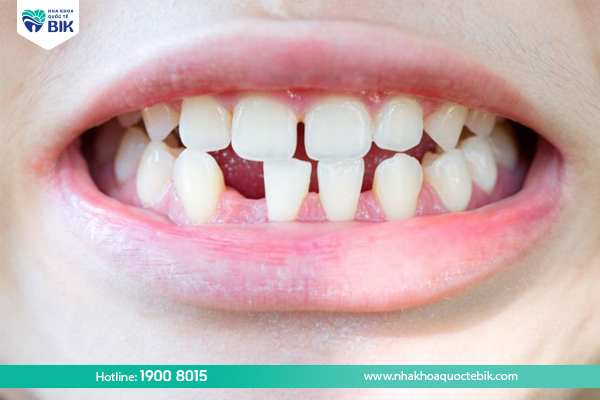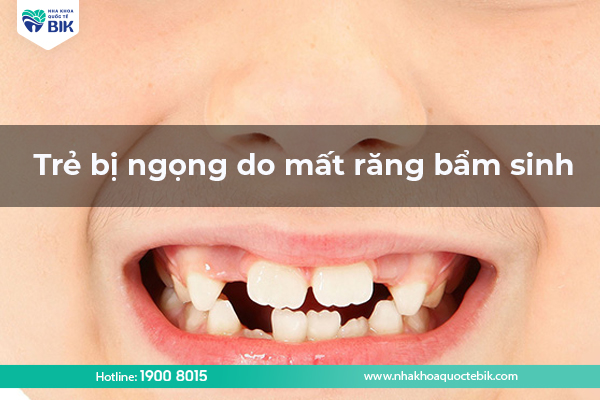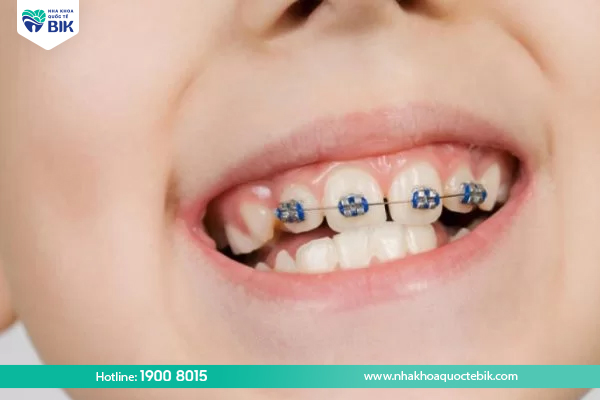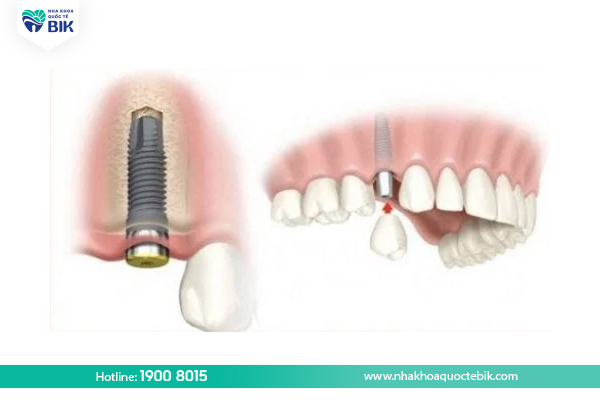Although not common, congenital tooth loss is a serious problem. It causes self-consciousness and affects the patient’s health. So what are the causes and effective treatments for congenital tooth loss? Let’s find out more with BIK International Dentistry in the following article.
WHAT IS CONGENITAL DENTISTRY?
Congenital tooth loss is an uncommon problem in human tooth development, which is a condition in which one or more teeth (usually less than 6) may be missing.
Congenital tooth loss often occurs in permanent teeth, with a rate of about 10-30% in the population, usually 1-2 teeth are missing. Congenital tooth loss in incisors and premolars are the next two common cases, mainly affecting the second premolars in the lower jaw and the incisors in the upper jaw, followed by the premolars in the lower jaw and other incisors.

CAUSES OF CONGENITAL TOOTH LOSS
Congenital tooth loss can stem from a number of main causes as follows:
Due to genetics
This is the most common and frequent reason leading to congenital tooth loss. If a family member has tooth loss, it is likely to be passed on to the next generation. In addition, the impact of pollution also plays an important role in causing this condition.
Influence from the mother during pregnancy
In addition, another reason that can cause congenital tooth loss is when the mother has diseases during pregnancy, especially measles and rubella.

Other objective reasons
In addition, it is also impossible to rule out some other causes of congenital tooth loss in children such as Down syndrome, Rieger syndrome, Hajdu-Cheney syndrome, etc.
Impacts on the tooth germ can also cause the teeth to not grow fully. In addition, smoking or using toxic drugs such as Thalidomide during pregnancy can also lead to tooth loss.
These are some of the main causes of congenital tooth loss. Next, we will learn about the effects of this condition on patients.
DISADVANTAGES OF PEOPLE WITH CONGENITAL TOOTH LOSS?
With the development of modern medicine, congenital tooth loss is no longer as common as before. However, there are still cases that occur and cause many problems for patients.
Loss of aesthetics
The lack of teeth from birth can make the smile less attractive, causing a loss of confidence when talking and expressing oneself. This can also affect the patient’s psychology over time.
Incorrect pronunciation
In addition, the lack of teeth from a young age also affects the child’s ability to pronounce. This can cause difficulty in talking to others.
Speech sounds are created using the oral cavity. Therefore, if teeth are missing, the resonance will be lost and the sound will become unclear.

Risk of dental diseases
In addition, another consequence of congenital tooth loss is an increased risk of oral health problems. Common diseases include tooth decay, gingivitis, bleeding gums and other problems.
Not only that, losing teeth at an early age also leads to impaired digestive function. This can put a lot of pressure on the digestive system when food is not chewed thoroughly, especially on the stomach.
Bone loss
In addition, missing teeth can lead to bone loss in the area where the teeth are missing. More seriously, this can cause jawbone collapse, affecting the facial structure and causing imbalance.
PREVENTION OF CONGENITAL MISSING TEETH IN CHILDREN
Parents can completely prevent and stop congenital missing teeth in their children by monitoring the process of baby teeth eruption and replacement for their children.
If it is found that the number of baby teeth is less than 20 or the number of permanent teeth when replaced is less than 28 (not counting wisdom teeth), it is necessary to seek professional intervention from a dentist.
In case of loss of baby teeth due to trauma, the dentist can create space to prepare for the eruption of permanent teeth.

HOW TO OVERCOME CONGENITAL TOOTH LOSS
As mentioned in the beginning, congenital tooth loss can cause many problems such as poor chewing ability, unsightliness, affecting the voice, damaging the gums and causing the jawbone to not develop properly. To overcome this condition, modern dentistry uses the following methods:
Braces
When teeth grow in the jawbone, the doctor can use braces. This process uses a system of brackets and archwires to apply continuous pressure, helping the teeth move to the correct position and pulling the impacted teeth out of the jawbone.
The time for braces usually lasts from 18 to 36 months depending on the condition of the teeth. Patients need to visit the dentist regularly to adjust the archwire and braces pressure.
Currently, there are many methods of braces such as ceramic braces, metal braces, clear aligners, etc. However, for the case of impacted teeth, self-ligating metal braces are considered the most effective because they are durable and reduce the time to adjust the teeth.

Porcelain bridge
In cases of congenital tooth loss, patients can consider making a porcelain bridge. This method is performed by grinding the teeth around the missing tooth position to create support pillars for the porcelain bridge above. For example, if you are missing a canine tooth, the doctor will grind the incisor and the small tooth below to create a pillar, then install a porcelain bridge consisting of three teeth above.
The advantage of this method is that it is quick, taking only 2 to 4 days to have new teeth.
However, because it only restores the upper part of the tooth, it does not prevent jawbone loss. In addition, the abutment teeth can also be damaged after a period of time and need to be removed to make a new bridge. Therefore, this is not the most suitable method for patients with congenital tooth loss.
Implant for congenital tooth loss
Implant is the most comprehensive method of denture implantation today, applied to most cases of tooth loss, including tooth loss in the entire jaw.
The implant is placed in the jawbone, acting as a base for the denture. After the abutment is firmly integrated into the jawbone, the porcelain tooth will be installed through the Abutment joint, forming a complete tooth with both the crown and the root.

Implant teeth are highly durable, restore aesthetics and chewing function almost completely like real teeth, helping patients eat comfortably without having to abstain from things like when using porcelain bridges or removable dentures. In particular, it also prevents bone loss, keeping the face from being deformed. The lifespan of dental implants can be up to 20 years, or even longer if properly cared for.
Therefore, doctors always encourage patients to consider dental implants from the beginning to overcome the condition of congenital tooth loss.
Above, BIK International Dental Clinic has shared information about congenital tooth loss. Hopefully this article will help you better understand the problem of congenital tooth loss and the most effective way to overcome it.


















